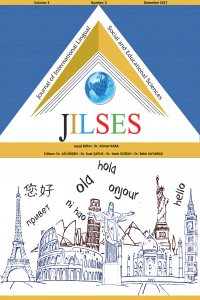İngilizce Yazı Yazma Derslerinde Akran Değerlendirmesi
akran değerlendirmesi, yazı yazma değerlendirmesi, yabancı dil olarak ingilizce yazı yazma, akranlarla iş birliği
Peer Assessment in EFL Writing Classes
___
- Black, P., and D. William. (1998). Assessment and classroom learning. Assessment in Education: Principles, Policy & Practice, 5(1), 7–74. doi: 10.1080/0969595980050102
- Boud, D. (1989). The role of self‐assessment in student grading. Assessment & Evaluation in Higher Education, 14(1), 20-30. doi:10.1080/0260293890140103
- Boud, D. (1995). Enhancing learning through self-assessment. Philadelphia, PA: Kogan Page.
- Boud, D. (2000). Sustainable assessment: Rethinking assessment for the learning society. Studies in Continuing Education, 22(2), 151-167. doi:10.1080/713695728
- Brown, S., & Glasner, A. (2003). Assessment matters in higher education: Choosing and using diverse approaches. Buckingham, UK: Open University Press.
- Cheng, W., & Warren, M. (2005). Peer assessment of language proficiency. Language Testing, 22, 93-121. doi: 10.1191/0265532205lt298oa.
- Cheung, S. K., & Sun, S. Y. K. (1999). Assessment of optimistic self-beliefs: Further validation of the chinese version of the general self-efficacy scale. Psychological Reports, 85(3), 1221–1224. doi: 10.2466/pr0.1999.85.3f.1221
- Cho, K., Schunn, C., & Wilson, R.W. (2006). Validity and reliability of scaffolded peer assessment of writing from the instructor and student perspectives. Journal of Educational Psychology 98, 891-901.
- Conway, R., Kember, D., Sivan, A. & Wu, M. (1993). Peer assessment of an individual's contribution to a group project. Assessment and Evaluation in Higher Education, 18, 45-56.
- Dochy, F., & McDowell, L. (1997). Assessment as a tool for learning. Studies in Educational Evaluation, 23, 279-298.
- Dochy, F., Segers, M., & Sluijsmans, D. (1999). The use of self-, peer and co-assessment in higher education: A review. Studies in Higher Education, 24(3), 331-350. doi: 10.1080/03075079912331379935
- Ehly, S. W., & Topping, K. J. (2001). Peer assisted learning: A framework for consultation. Journal of Educational and Psychological Consultation, 12(2), 113-132. doi: 10.1207/S1532768XJEPC1202_03
- Falchikov, N. (1995). Peer feedback marking: Developing peer assessment. Innovations in Education and Training International, 32(2), 175-187. doi:10.1080/1355800950320212
- Keaten, J. A., & Richardson, M. E. (1993, February 12-16). A field investigation of peer assessment as part of the student group grading process. Paper presented at the Annual Meeting of the Western Speech Communication Association, Albuquerque, New Mexico.
- Lee, C. (2006). Language for learning mathematics: Assessment for learning in practice. Buckingham, England: Open University Press.
- Loacker, G. & Jensen, P. (1988). The power of performance in developing problem solving and self-assessment abilities. Assessment and Evaluation in Higher Education, 13, 128-150.
- McDowell, L. (1995). The impact of innovative assessment on student learning. Innovations in Education and Training International, 32(4), 302-313.
- Moerkerke, G. (1996). Assessment for flexible learning. Utrecht, The Netherlands: Lemma.
- Oldfield, K.A., & Macalpine, J.M.K. (1995). Peer and self-assessment at tertiary level: An experiential report. Assessment and Evaluation in Higher Education 20, 125-132.
- Patri, M. (2002). The influence of peer feedback on self- and peer-assessment of oral skills. Language Testing, 19(2): 109-131
- Raimes, A. (1983). Tradition and revolution in ESL teaching. TESOL Quarterly, 17(4), 535-552.
- Sambell, K. & McDowell, L. (1998). The value of self and peer assessment to the developing lifelong learner. In C. Rust (Ed.) Improving student learning - improving students as learners (pp. 56-66). Oxford, UK: Oxford Centre for Staff and Learning Development.
- Topping, K.J. (1998). Peer assessment between students in college and university. Review of Educational Research 68(3), 249–276. doi:10.3102/00346543068003249
- Villamil, O.S., & De Guerrero, M.C.M. (1996). Peer revisions in the L2 classroom: Social cognitive activities, mediating strategies, and aspects of social behavior. Journal of Second Language Writing 5(1): 51-75.
- Williams, E. (1992). Student attitudes towards approaches to learning and assessment. Assessment and Evaluation in Higher Education, 17, 45-58.
- Yorke, M. (2003). Formative assessment in higher education: Moves towards theory and enhancement of pedagogic practice. Higher Education, 45, 477–501.
- Yayın Aralığı: Yılda 2 Sayı
- Başlangıç: 2015
- Yayıncı: Ahmet KARA
Argümantasyon Yönteminin Kullanıldığı Deneysel Çalışmaların Analizi: Bir Meta-Sentez Çalışması
Doğal Boyamanın Farklı Tekstil Lifleri İle Oluşturulan Yüzeylere Etkisi
Esra SUNERLİ, Muazzez ÇAKIR AYDIN
8. Sınıf “Enerji Kaynakları ve Geri Dönüşüm” Konusu Öğretiminde Jigsaw Tekniğinin Etkileri
Evşen AYMEN PEKER, Mübeccel YALÇIN
Knidos Hellenistik Ev Duvar Resmi
Lise Dil Bölümünde Okuyan 11. ve 12. Sınıf Öğrencilerine Göre İngilizce Dil Öğretmeni Yeterlilikleri
21. Yüzyıl Yeterlilikleri Ölçeği’nin Geliştirilmesi: Geçerlik ve Güvenirlik Çalışması
